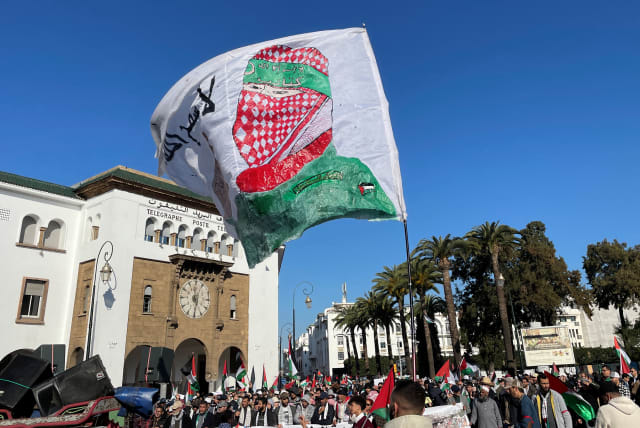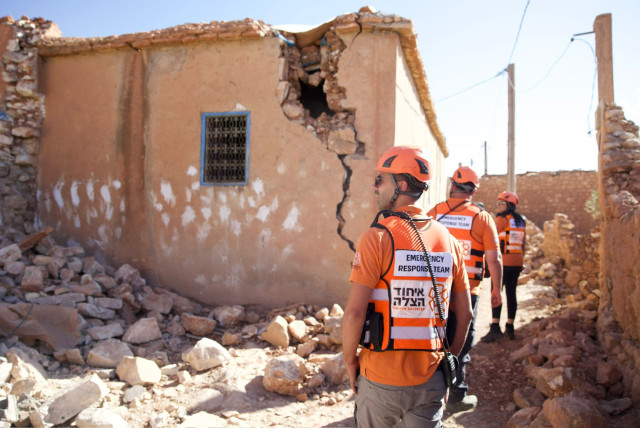Media bias strains Moroccan-Israeli relations as government outlets seek objectivity

Recurrent conflicts between Israelis and Palestinians can weaken ties between Israel and Morocco. However, this time, the bond between both countries is stronger, and the future seems hopeful.
Over three years have passed since Israel and Morocco signed their normalization agreements. Since then, ties between the two countries have been taking off slowly but steadily. However, given Morocco's historic neutrality, the ongoing war between Israel and Hamas in Gaza presents challenges for their relationship. But unlike during previous Israeli-Palestinian conflicts, this time, the base of the ties is more solid than ever, with Rabat trying to mitigate the public's polarization while maintaining its ties with Israel, aiding people in Gaza, and supporting peace.
Einat Levi is a strategic advisor on Israeli-Moroccan relations and a researcher at the Mitvim Institute for Regional Foreign Policies. She has been closely following relations between the two countries for over a decade, and previously led the economic and academic affairs of the Israeli Mission to Rabat. Levi recognizes that the current war caused a loss of the positive momentum achieved since the two countries officially renewed their relations in December 2020. However, she told The Media Line, "The ties between Israel and Morocco are still strong, thanks to the solid base of mutual interests and shared values and culture."
According to Levi, the war created many challenges, including a setback in a field in which both countries' cooperation has thrived the most: tourism. Levi noted that direct flights between Tel Aviv and Rabat are still on hold, and a travel warning is in effect with a rating of three out of four, advising Israelis to avoid non-essential travel to Morocco. As a result, "Israeli and international Jewish tourism to Morocco has almost entirely ceased, with only a few groups continuing to visit," she said.
Media coverage plays an important role in the public opinion in both countries. Levi pointed out that many Moroccans receive information about the war primarily from the Qatar-owned Al Jazeera, a supporter of Hamas and other factions associated with the Muslim Brotherhood in the region. "There is a significant challenge regarding the partial picture portrayed in mass media and social networks, not to mention the issue of fake news," she added.
Levi stressed that while in Israel, there is minimal coverage of the Palestinian side, in Morocco and other Muslim countries, there is limited coverage of the hardships faced by Israeli society. "This dynamic contributes to the development of a 'black and white' perception of the conflict, simplifying it into a narrative of perpetrators and victims," she warned.
As a result, she noted that issues that are more complex, such as the numerous initiatives involving Jewish-Muslim solidarity, are often marginalized and excluded from the agenda-setting of most media outlets.
Media coverage impacting Moroccan perception
Mouna Izddine, a Moroccan freelance journalist and writer specializing in Moroccan Judaism and Moroccan-Israeli relations, confirmed that the media coverage of the war is affecting the Moroccan perspective. She told The Media Line that, like in previous Israeli-Palestinian conflicts, "This new war between Hamas and Israel has frankly not been covered objectively."
In Morocco, the majority of the media, especially the print media, Izddine explained, "Simply condemn the Israeli intervention and accuse the Hebrew state of targeting civilians or even of committing genocide with the aim of eliminating the Palestinians from Gaza and driving out those who remain to take over their land."
At the same time, she noted that very few media outlets mention the October 7 massacre committed by Hamas against Israelis and do not refer to that organization as terrorist but as a "resistance movement against a 75-year occupation."
However, this time there is a difference, she continued. Izddine noted that, unlike previous crises, the official media or those known to be close to the Moroccan government are trying to remain as neutral as possible in their coverage of the war. This is being done, she said, "while reiterating the immutability of Morocco's position on the political resolution of the conflict, namely the two-state solution."
Levi added that the latter reflects the Moroccan leadership's consistent policy regarding the Israel-Hamas war in general. "Morocco has been consistent in its support of the two-state solution," she said, further noting that it recognizes the PLO as the Palestinian representative, and actively sends humanitarian aid to Gaza; simultaneously, the country's official position on its strategic interest in relations with Israel remains unchanged.
"This was evident during the extraordinary Arab Islamic Conference in Riyadh in November, where Morocco, along with other influential Arab and Muslim nations, chose not to endorse specific decisions or actions against their ties with Israel," she said. Also, Morocco's decision to maintain its ambassador in Tel Aviv serves as a significant statement in support of this position, Levi added.
This is why she believes that given Morocco's unique position due to its relations with both sides, "the current crisis also provides an opportunity for regional and bilateral collaboration." The day after the war concludes, Morocco could play an important role as part of a broader coalition dedicated to rehabilitation and reconstruction processes, according to Levi.
"It could help in the reconstruction itself and in implementing local and regional programs to deal with and prevent extremism and violence and assist in the training of public employees deployed in Gaza," she said, adding that Rabat could also host forums, meetings, and conferences to support and promote a sustainable solution to the Israeli-Palestinian conflict.
Regarding the slowdown of Israel-Morocco ties, Izddine said that this is not new and has been seen in most times of tensions between Israelis and Palestinians. Though, she emphasized that this time, the nature of the normalization helped create a more solid base that will safeguard both countries' relations.
She noted that this is due to two factors: The first is that this tripartite agreement was concluded at the initiative of the United States, which is a historical and immutable ally of Morocco. Second, she stressed that the deal included the American recognition of the Kingdom of Morocco's sovereignty over the Sahara, which is an important issue for the North African nation.
Jerusalem Post Store
`; document.getElementById("linkPremium").innerHTML = cont; var divWithLink = document.getElementById("premium-link"); if (divWithLink !== null && divWithLink !== 'undefined') { divWithLink.style.border = "solid 1px #cb0f3e"; divWithLink.style.textAlign = "center"; divWithLink.style.marginBottom = "15px"; divWithLink.style.marginTop = "15px"; divWithLink.style.width = "100%"; divWithLink.style.backgroundColor = "#122952"; divWithLink.style.color = "#ffffff"; divWithLink.style.lineHeight = "1.5"; } } (function (v, i) { });

